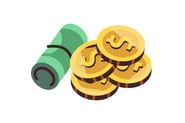How to Navigate and Recover from the Post-Holiday Financial Slowdown: A Step-by-Step Guide
Ever woken up in January with a financial hangover that makes the holiday festivities seem like a distant dream? You’re facing what experts call the...
Whether you're covering unexpected expenses, making a big purchase, or just need extra cash, our personal loans offer simple, flexible funding tailored to your needs.
Simplify your finances with a loan that combines multiple payments into one. Our consolidation loans help reduce stress and keep your budget on track.
Upgrade your living space with financing designed for renovations, repairs, or remodeling. Our home improvement loans help you enhance your home’s comfort, value, and functionality—on your terms.
Explore expert insights, financial tips, and strategic guidance from the Symple Lending team. Our insights and resource articles are your go-to source for empowering content that helps you make informed decisions on your journey to financial freedom.
Stay up-to-date with the latest press releases, media features, and major announcements from Symple Lending. This section showcases how we're making headlines and driving innovation in the lending industry.
9 min read
Breanne Neely : October 22, 2025

Table of Contents
Many Americans find themselves with little leftover after paying the essentials — recent data suggests that somewhere between one-quarter and one-third of households spend nearly all their income on necessities. Yet most spend less than 5 minutes weekly on financial planning. The disconnect is clear, but the solution might be simpler than you think.
In a world where we track everything from steps to sleep quality, our finances deserve the same attention. Modern budgeting tools have transformed money management from a dreaded chore into an accessible daily habit—one that could be the difference between financial stress and financial freedom. Free budgeting apps are widely available, making it easy for anyone to start budgeting without any upfront costs.
Many of these tools are designed with a user friendly interface, making financial planning less intimidating and more approachable for everyone.
Remember when tracking expenses meant saving receipts and manual entry? Today's financial management apps have changed the game. Modern budgeting tools offer three major advantages that make money management simpler for anyone.
First, automation connects your accounts to track spending without the hassle of data entry. Your transactions appear automatically, giving you more time to analyze rather than input information.
Second, these tools boost accountability through goal-setting features, bill reminders, and the ability to share finances with family members—making it harder to ignore your spending habits.
Additionally, modern budgeting tools provide robust budgeting features such as customizable categories, spending limits, and detailed reporting tools, allowing users to tailor their budgets and monitor expenses more effectively.
Finally, the enhanced visibility through real-time dashboards shows exactly where your money goes through clear reports and visualizations. You'll see your net worth, spending patterns, and savings progress at a glance.
When you're focused on maintaining healthy financial habits, choosing the right budgeting app for your needs becomes especially important to prevent overspending and keep your financial goals on track.
Today's finance apps connect directly with your bank accounts, credit cards, and loans to import transactions automatically. No more manual entry or forgotten expenses—tools like Mint and YNAB sync your accounts daily, showing accurate financial snapshots without the tedious work. Budgeting apps automatically sync with your financial data to streamline expense tracking, making it easier to visualize spending patterns in real time.
Modern budgeting tools don't just track money—they help you stick to your plans. Features like spending alerts, payment reminders, and collaborative goals make it harder to ignore your finances. Many apps now include collaboration tools that enable real-time sharing, tagging expenses, and setting shared goals, making it easier for families or small teams to manage finances together. Many of the top budgeting tools send notifications when you're approaching budget limits, helping prevent overspending before it happens.
The visual dashboards in today's personal finance tools transform numbers into meaningful insights. Color-coded spending categories, progress bars for savings goals, and net worth tracking give you an immediate understanding of your financial health. Many apps also let you generate custom reports, allowing you to analyze spending patterns and track progress toward your financial goals in detail. This clear picture helps you make smarter decisions about where to cut back and where to save more.
Choosing the right budgeting method is a crucial step toward achieving your financial goals. Different budgeting methods cater to different lifestyles and preferences, making it easier to simplify budgeting and stay on track. One of the most popular approaches is the zero-based budgeting method, where every dollar you earn is assigned a specific purpose—whether it's for bills, savings, or fun. This method ensures that all your income is accounted for, leaving no room for unintentional spending.
Another effective strategy is envelope budgeting, which involves dividing your money into spending categories like groceries, transportation, and entertainment. Traditionally, this meant using physical envelopes, but today's budgeting apps have digitized the process, allowing you to allocate funds to virtual envelopes and track expenses with ease. Apps like YNAB and EveryDollar are designed to support these budgeting methods, offering features that help you categorize expenses, monitor your progress, and make informed decisions about your money.
By understanding and implementing a budgeting method that fits your needs, you can simplify budgeting, reduce financial stress, and set yourself up for long-term financial stability.
One of the standout features of modern budgeting apps is their ability to integrate directly with your bank account, checking and savings accounts, and other financial accounts. This seamless connection means your transactions are automatically imported and categorized, giving you a real-time overview of your monthly spending without the hassle of manual entry.
With bank account integration, budgeting apps can track spending across all your accounts, including credit cards and savings accounts, providing a comprehensive picture of your finances. Features like automatic expense categorization, bill reminders, and customizable savings goals help you stay organized and proactive about your financial obligations. By having all your financial information in one place, you can easily identify areas for improvement, plan ahead for upcoming bills, and make more informed financial decisions.
Leveraging bank account integration not only simplifies budgeting but also reduces the risk of errors and missed payments, empowering you to take control of your financial future with confidence.
 Tackling debt can feel overwhelming, but budgeting apps offer powerful tools to help you create and stick to a debt payoff plan. Whether you prefer the debt snowball method—paying off your smallest balances first for quick wins—or the debt avalanche method, which targets high-interest debts to save money over time, budgeting apps can support your strategy.
Tackling debt can feel overwhelming, but budgeting apps offer powerful tools to help you create and stick to a debt payoff plan. Whether you prefer the debt snowball method—paying off your smallest balances first for quick wins—or the debt avalanche method, which targets high-interest debts to save money over time, budgeting apps can support your strategy.
Apps like Rocket Money go beyond basic tracking by offering debt payoff plans, bill negotiation services, and credit score monitoring. These features allow you to automate payments, set reminders, and track your progress as you work toward becoming debt-free. Some budgeting apps offer additional tools, such as identifying unwanted subscriptions or negotiating lower bills, to help you free up extra cash for your debt payoff plan.
By using the debt management features that budgeting apps offer, you can take control of your financial obligations, reduce stress, and make steady progress toward financial freedom.
Building wealth isn't just about saving—it's also about making your money work for you. Budgeting apps now offer robust investment tracking features, allowing you to link your investment accounts and monitor your portfolio's performance alongside your everyday finances. By connecting brokerage services and other investment accounts, you can view your holdings, track gains and losses, and see how your investments contribute to your overall net worth.
Apps like Empower Personal Dashboard provide a personal dashboard that brings together your investment tracking, net worth tracking, and retirement planning tools in one place. These features help you set and monitor financial goals, analyze your asset allocation, and make informed decisions about your investment strategy. With real-time insights and easy-to-understand reports, budgeting apps offer the confidence and clarity you need to grow your wealth over time.
By leveraging the investment tracking features that budgeting apps offer, you can simplify investment management, stay focused on your long-term financial goals, and make smarter, more informed decisions about your financial future.
A healthy credit score is the cornerstone of financial stability, and budgeting apps make it easier than ever to monitor and manage your credit. By offering features such as credit report tracking, credit score monitoring, and alerts for changes in your credit reports, these apps help you stay on top of your credit health.
Apps like Credit Karma provide detailed credit report analysis, helping you understand the factors that impact your score and identify opportunities for improvement. With regular updates and actionable insights, you can catch potential issues early, avoid costly mistakes, and make informed financial decisions that support your long-term goals.
By taking advantage of the credit score management features that budgeting apps offer, you can simplify credit management, reduce financial stress, and build a strong foundation for your financial future.
The holidays bring joy—and extra expenses. Gift shopping, travel arrangements, and hosting gatherings can quickly add up, putting pressure on your wallet. Without careful planning, these seasonal costs may derail your long-term financial goals, like saving for a home or paying down debt.
When shopping malls are filled with tempting sales and your calendar is packed with events, sticking to a budget becomes especially challenging. This is where personal finance apps shine. Instead of guessing how much you've spent on gifts or wondering if you can afford that holiday trip, budgeting tools provide real-time updates on your spending.
With automatic transaction tracking and category budgeting, you can set category-specific budget limits for different types of expenses, such as gifts, travel, or utility bills. This method allows you to monitor holiday expenses separately from everyday costs. Many top budgeting tools even allow you to create specific holiday spending plans or share budgets with family members, making group gift coordination simpler and preventing unexpected financial stress when January arrives.
Mint offers a free version with seamless account syncing, simple expense tracking, and a comprehensive financial overview. It also includes an investment tool for tracking your portfolio, making it perfect if you want broad oversight of your money without paying subscription fees.
YNAB app (You Need a Budget) focuses on building healthy money habits through its zero-based method, where every dollar gets a job. The YNAB app is available on multiple platforms, including Google Play and a desktop version, and features real-time tracking, an intuitive interface, and educational resources to help users develop lasting financial skills.
EveryDollar app provides a straightforward, quick setup approach to zero-based budgeting. It's particularly user-friendly for beginners and fans of Dave Ramsey's financial principles. The EveryDollar app offers both a free version and a paid version, with the paid version including advanced features.
PocketGuard highlights what's safe to spend after bills and savings goals, making day-to-day decisions easier. It also helps with managing subscriptions and can automate savings to help you reach your financial goals.
Spendee and Goodbudget excel at shared finances, using an envelope-style system. These tools work well for couples, roommates, or families managing money together, with Goodbudget offering both manual and automated options depending on your plan. Goodbudget's paid version includes unlimited envelopes, and both apps feature collaboration tools and an easy to navigate interface.
Compared to other apps, these budget apps offer a range of features, from flex budgeting and category budgeting to custom reports and a net worth tracker. Many budgeting apps are available as free budgeting tools, while some offer a basic plan with limited features and a paid version with advanced options.
Many apps allow integration with financial accounts to track personal loans and other financial products. Whether you need simple expense tracking, investment tools, or advanced reporting, there are budget apps to fit every need.
Finding the perfect money management app means matching your personal needs with the right features. If automated tracking is your priority, look to fully-synced options like Mint, Monarch Money, or Tiller. Couples or families might prefer apps with collaboration features such as Spendee, Monarch, or Goodbudget.
Consider these key factors when selecting your personal finance tool:
Your personal style matters too. Tech enthusiasts might enjoy apps with advanced automation and investment tracking, like Empower or Monarch Money. Spreadsheet lovers often prefer Tiller's automated data in familiar Excel or Google Sheets formats. If you want more manual control or are just starting out with money management, simpler options like EveryDollar provide a gentle introduction to expense tracking with an intuitive interface, making it easy to get started without overwhelming features.
The specific money management app you choose matters less than using it regularly. Setting up a daily or weekly check-in with your chosen tool creates a financial rhythm that leads to better money habits.
Users who stick with one personal finance system—whether it's YNAB, Mint, or a simple spreadsheet—typically see their spending align better with their savings goals over time. The most feature-rich expense tracker won't help if you abandon it after a week.
Success comes from persistence, not perfect features. Even the simplest budget app used consistently will outperform the most sophisticated one used sporadically. Consider setting calendar reminders for weekly finance check-ins to build this money management muscle.
Remember that financial planning tools work best when they become part of your routine. Like physical exercise, the benefits of budget tracking compound over time—what starts as a conscious effort eventually becomes second nature.
Ready to take control of your finances? Challenge yourself to a 30-day budgeting experiment. Pick just one personal finance app from our list and use it consistently for a month. This short commitment can reveal patterns you never noticed before.
Don't just track your spending—pair your chosen tool with specific goals. Maybe you want to save for a holiday gift fund or reduce your dining expenses by 15%. Having a clear target makes your 30-day trial more meaningful.
The real power of these money management apps comes when you use them as stepping stones to bigger financial wins. Start with daily check-ins during your morning coffee, then graduate to weekly reviews as habits form.
Remember, the best financial tool is the one you'll actually use. Your 30-day commitment might just become the foundation for lasting financial confidence.
Taking control of your finances doesn't require an accounting degree or hours of number-crunching anymore. The right budgeting tool acts as both a compass and a companion on your financial journey, providing insights that lead to better decisions and peace of mind.
Remember that financial well-being isn't about perfection—it's about progress. Whether you choose a sophisticated app with all the bells and whistles or a streamlined solution that focuses on the basics, the most important step is simply to begin. Your future self will thank you for the financial clarity you create today.
Disclaimer: The information provided in this blog post is for educational and informational purposes only and should not be considered as financial, legal, investment, or tax advice. Symple Lending is not responsible for any financial outcomes resulting from following the information or ideas shared in this blog. Every individual's financial situation is unique, and we strongly encourage readers to take their own circumstances into consideration and consult with a qualified financial, legal, tax, and investment advisor before making any financial decisions. Symple Lending does not provide financial, legal, tax, or investment advice.

Ever woken up in January with a financial hangover that makes the holiday festivities seem like a distant dream? You’re facing what experts call the...

Did you know that the average American checks their bank account 8 times a week? That’s over 400 financial check-ins per year. No wonder money stress...

Ever noticed how a shaky budget can feel like trying to navigate a ship through stormy waters? Financial stress affects a staggering 77% of...

Did you know the average American manages 5-10 financial accounts and deals with over 15 different bills each month? Managing multiple accounts can...

Did you know that the average person wastes over $1,500 annually on unused subscriptions and inefficient spending habits? In today's economic...

Ever find yourself staring at your calendar in mid-December, wondering how the holidays snuck up so quickly? While everyone else seems to have their...